59 Macronutrients Rich Foods, Fruits & Vegetables to Include in Your Diet
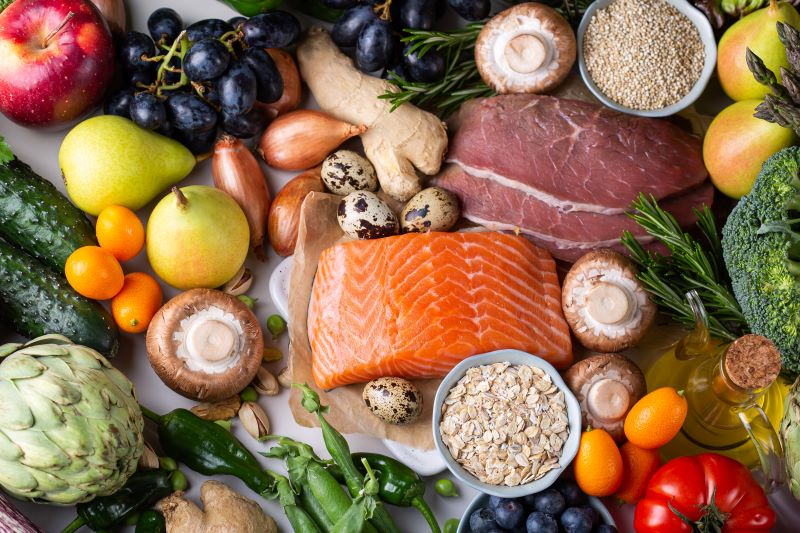
Macronutrients are very important for the body to function. They provide the energy needed for daily activities, help repair cells and promote growth. Carbohydrates are essential because they serve as a primary source of fuel, while proteins contribute greatly to building muscles and improving immunity.
On the other hand, fats facilitate the absorption of nutrients into the body and play a significant role in hormone synthesis. Therefore, one must eat all these nutrient-rich foods in the right proportions if he or she wants to be healthy throughout life.

Table of Contents

What are Macronutrients?
Macronutrients are the dietary elements that provide our bodies with energy and help them function properly. They are required in large quantities relative to micronutrients, which are needed in smaller amounts.
Carbohydrates, proteins, and fats comprise the three main macronutrient categories. Each has a different role in maintaining overall health.
What are the Sources of Macronutrients?
There is a great variety of sources for macronutrients; they can be found in many different types of food products. Common sources include grain-based foods like bread or pasta; fruits such as apples or bananas; vegetables like potatoes or broccoli; beans including lentils or kidney beans; nuts such as almonds or walnuts; and sunflower seeds.
Meat (beef), poultry (chicken), fish (salmon) and dairy products (milk) are also rich sources depending on one’s dietary preference. Lastly, oils derived from avocados or olive oil are also considered healthy fats, providing necessary energy when consumed moderately.
Top 59 Food Items High in Macronutrients
Discover 59 food items dense in carbohydrates, proteins, and fats. These will power your body and ensure overall health and vibrancy. They create a balanced diet ranging from lean protein to complex carbs or healthy fat, which can be the foundation for everything else
List of Macronutrients Rich Vegetables

Each vegetable provides different macronutrients like carbohydrates, proteins and fats, which are essential to keep you energised and healthy.
| SNo. | Vegetables | Macronutrients Content (Per 100 grams) |
| 1 | Spinach | Carbohydrates: 3.6 g Proteins: 2.9 g Fats: 0.4 g |
| 2 | Broccoli | Carbohydrates: 6.6 g Proteins: 2.8 g Fats: 0.4 g |
| 3 | Sweet potatoes | Carbohydrates: 20.1 g Proteins: 1.6 g Fats: 0.1 g |
| 4 | Kale | Carbohydrates: 8.8 g Proteins: 4.3 g Fats: 0.6 g |
| 5 | Brussels sprouts | Carbohydrates: 8.95 g Proteins: 3.38 g Fats: 0.3 g |
| 6 | Cauliflower | Carbohydrates: 4.97 g Proteins: 1.92 g Fats: 0.28 g |
| 7 | Bell peppers (red) | Carbohydrates: 6 g Proteins: 0.99 g Fats: 0.3 g |
| 8 | Carrots | Carbohydrates: 9.58 g Proteins: 0.93 g Fats: 0.24 g |
| 9 | Asparagus | Carbohydrates: 3.88 g Proteins: 2.2 g Fats: 0.14 g |
| 10 | Green peas | Carbohydrates: 14.45 g Proteins: 5.42 g Fats: 0.4 g |
List of Fruits Rich in Macronutrients
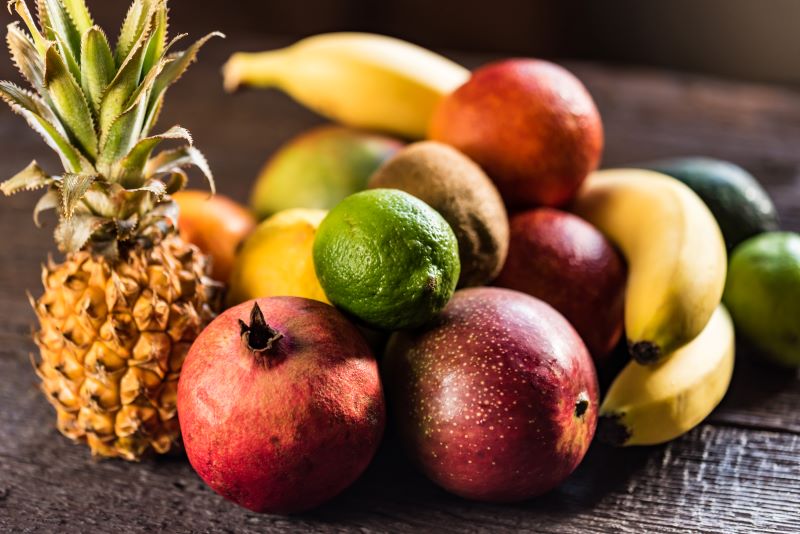
Enjoy the sweetness and juiciness of fruits while getting all the nutrients that come with them. They contain carbs, proteins and good fats needed for energy and wellness.
SNo. |
Fruits | Macronutrients Content (Per 100 grams) |
| 11 | Avocado | Carbohydrates: 8.53 g Proteins: 2 g Fats: 14.66 g |
| 12 | Bananas | Carbohydrates: 22.84 g Proteins: 1.09 g Fats: 0.33 g |
| 13 | Apples | Carbohydrates: 13.81 g Proteins: 0.26 g Fats: 0.17 g |
| 14 | Oranges | Carbohydrates: 8.2 g Proteins: 1.3 g Fats: 0.2 g |
| 15 | Strawberries | Carbohydrates: 7.68 g Proteins: 0.67 g Fats: 0.3 g |
| 16 | Blueberries | Carbohydrates: 14.49 g Proteins: 0.74 g Fats: 0.33 g |
| 17 | Grapes | Carbohydrates: 18.1 g Proteins: 0.72 g Fats: 0.16 g |
| 18 | Pineapple | Carbohydrates: 13.12 g Proteins: 0.54 g Fats: 0.12 g |
| 19 | Mango | Carbohydrates: 14.98 g Proteins: 0.82 g Fats: 0.38 g |
| 20 | Papaya | Carbohydrates: 10.82 g Proteins: 0.47 g Fats: 0.26 g |
| 21 | Kiwi | Carbohydrates: 14.66 g Proteins: 1.14 g Fats: 0.52 g |
| 22 | Watermelon | Carbohydrates: 7.55 g Proteins: 0.61 g Fats: 0.15 g |
| 23 | Pears | Carbohydrates: 15.46 g Proteins: 0.36 g Fats: 0.14 g |
| 24 | Cherries | Carbohydrates: 12.18 g Proteins: 1.06 g Fats: 0.2 g |
List of Cereals and Dairy Products Containing Macronutrients
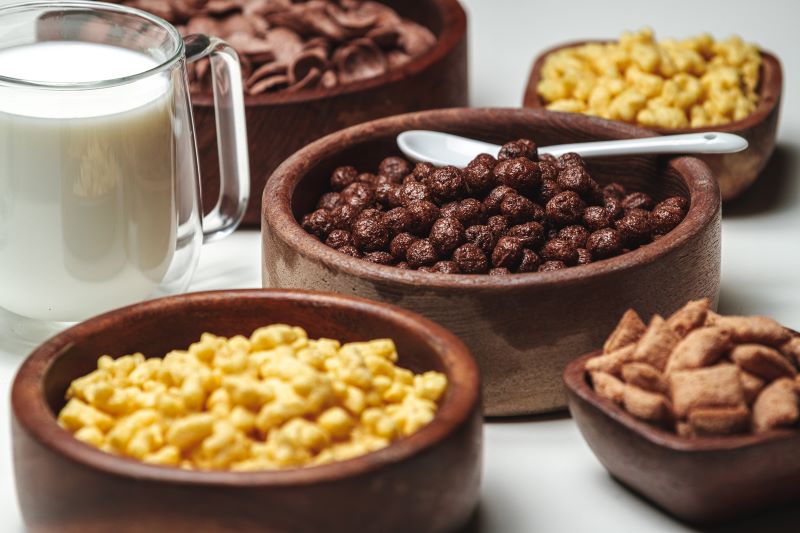
There is a wide range of grain foods as well as milk-based products such as cheese or yoghurt, where we can find carbohydrates (energy), proteins (building blocks) and fats (for body functions).
SNo. |
Cereals and Dairy Products | Macronutrients Content (Per 100 grams) |
| 25 | Oats | Carbohydrates: 60.4 g Proteins: 16.9 g Fats: 6.9 g |
| 26 | Greek Yoghurt | Carbohydrates: 3.6 g Proteins: 10 g Fats: 10 g |
| 27 | Milk | Carbohydrates: 4.8 g Proteins: 3.3 g Fats: 3.6 g |
| 28 | Cheese | Carbohydrates: 1.3 g Proteins: 25 g Fats: 33 g |
| 29 | Cottage Cheese | Carbohydrates: 3.4 g Proteins: 11 g Fats: 4.3 g |
| 30 | Whole Grain Bread | Carbohydrates: 45.1 g |
| 31 | Yoghurt | Carbohydrates: 4.7 g Proteins: 3.5 g Fats: 3.3 g |
| 32 | Cheddar Cheese | Carbohydrates: 1.3 g Proteins: 24.9 g Fats: 33.1 g |
| 33 | Almond Milk | Carbohydrates: 3.2 g Proteins: 0.4 g Fats: 1.1 g |
| 34 | Swiss Cheese | Carbohydrates: 2.2 g Proteins: 28.4 g Fats: 27.8 g |
| 35 | Yogurt (Low-fat) | Carbohydrates: 4.7 g Proteins: 3.5 g Fats: 1.8 g |
| 36 | Skim Milk | Carbohydrates: 4.8 g Proteins: 3.4 g Fats: 0.2 g |
List of Seeds and Nuts Rich in Macronutrients
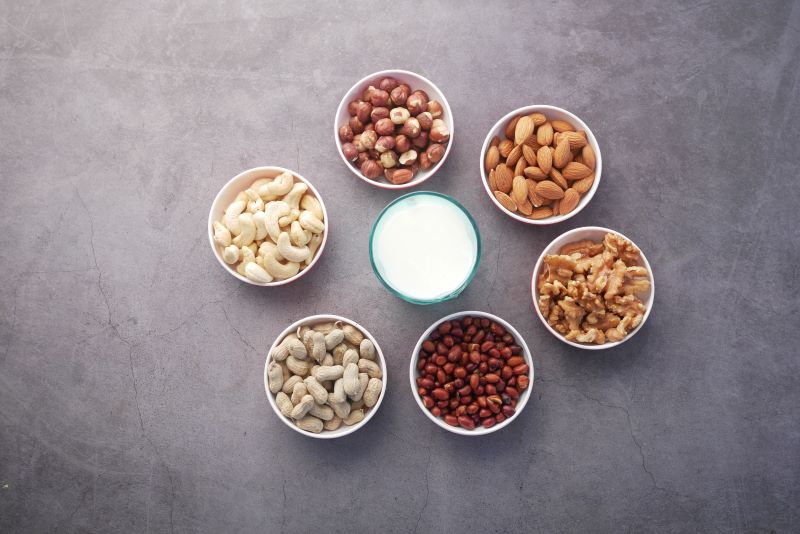
Find out how many carbs, proteins or fats are in sunflower or pumpkin seeds and nuts like almonds too. They can be great snacks when you need some quick fuel.
SNo. |
Seeds and Nuts | Macronutrients Content (Per 100 grams) |
| 37 | Almonds | Carbohydrates: 21.7 g Proteins: 21.2 g Fats: 49.9 g |
| 38 | Walnuts | Carbohydrates: 13.7 g Proteins: 15.2 g Fats: 65.2 g |
| 39 | Cashews | Carbohydrates: 30.2 g Proteins: 18.2 g Fats: 43.9 g |
| 40 | Sunflower Seeds | Carbohydrates: 20 g Proteins: 20.8 g Fats: 51.5 g |
| 41 | Pumpkin Seeds | Carbohydrates: 10.7 g Proteins: 30.2 g Fats: 49 g |
| 42 | Chia Seeds | Carbohydrates: 42.1 g |
| 43 | Flaxseeds | Carbohydrates: 28.9 g Proteins: 18.3 g Fats: 42.2 g |
| 44 | Pistachios | Carbohydrates: 27.2 g Proteins: 20.6 g Fats: 45.4 g |
| 45 | Hazelnuts | Carbohydrates: 16.7 g Proteins: 14.1 g Fats: 60.8 g |
| 46 | Sesame Seeds | Carbohydrates: 23.4 g Proteins: 17.7 g Fats: 49.7 g |
| 47 | Pecans | Carbohydrates: 13.9 g Proteins: 9.2 g Fats: 72 g |
| 48 | Brazil Nuts | Carbohydrates: 12.3 g Proteins: 14.3 g Fats: 66.4 g |
List of Animal and Seafood High in Macronutrients
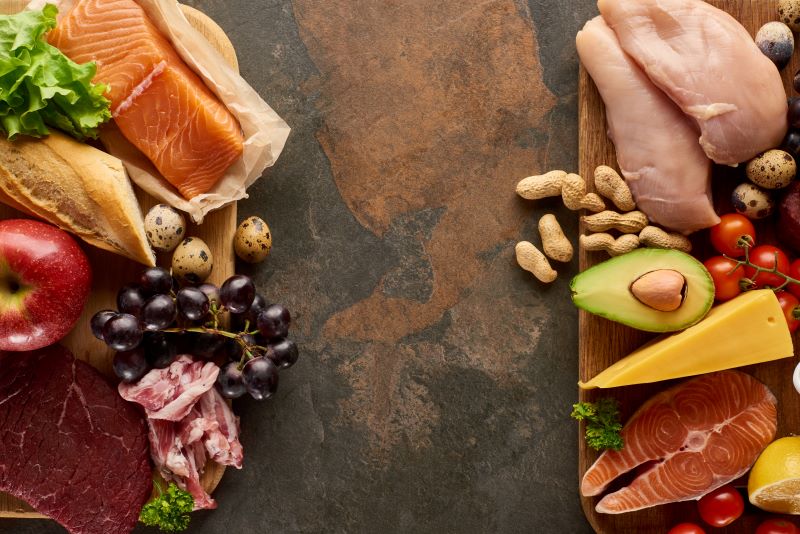
Lean meats have plenty of protein but also provide fats like fish, especially oily ones such as sardines. Shellfish are another option if muscles require repair after a workout.
SNo. |
Animal and Seafood | Macronutrients Content (Per 100 grams) |
| 49 | Chicken Breast | Carbohydrates: 0 g Proteins: 31 g Fats: 3.6 g |
| 50 | Turkey Breast | Carbohydrates: 0 g Proteins: 29 g Fats: 1 g |
| 51 | Beef | Carbohydrates: 0 g Proteins: 26 g Fats: 20 g |
| 52 | Salmon | Carbohydrates: 0 g Proteins: 20 g Fats: 13 g |
| 53 | Tuna | Carbohydrates: 0 g Proteins: 29 g Fats: 1 g |
| 54 | Shrimp | Carbohydrates: 1 g |
| 55 | Cod | Carbohydrates: 0 g Proteins: 18 g Fats: 0.7 g |
| 56 | Pork | Carbohydrates: 0 g Proteins: 27 g Fats: 3 g |
| 57 | Crab | Carbohydrates: 0 g Proteins: 19 g Fats: 2 g |
| 58 | Lobster | Carbohydrates: 1.2 g Proteins: 20 g Fats: 1 g |
| 59 | Eggs | Carbohydrates: 1.1 g Proteins: 13 g Fats: 11 g |
How Many Macronutrients Should You Intake?
Here is the table of recommended daily intake for macronutrients differentiated by age, sex and life stages according to the National Institute of Health.
Age Group |
Recommended Macronutrient Intake (Milligrams Per Day) |
| Infants 0-6 months | Carbohydrates: 60 g, Proteins: 9.1 g, Fats: 31 g |
| Infants 7-12 months | Carbohydrates: 95 g, Proteins: 11 g, Fats: 30 g |
| Children 1-3 years | Carbohydrates: 130 g, Proteins: 13 g, Fats: 30 g |
| Children 4-8 years | Carbohydrates: 130 g, Proteins: 19 g, Fats: 25 g |
| Children 9-13 years | Carbohydrates: 130 g, Proteins: 34 g, Fats: 25 g |
| Male Teens 14-18 years | Carbohydrates: 130 g, Proteins: 52 g, Fats: 25 g |
| Female Teens 14-18 years | Carbohydrates: 130 g, Proteins: 46 g, Fats: 25 g |
| Male Adults 19+ years | Carbohydrates: 130 g, Proteins: 56 g, Fats: 25 g |
| Female Adults 19+ years | Carbohydrates: 130 g, Proteins: 46 g, Fats: 25 g |
| Pregnant Teens/ Adults | Carbohydrates: 175 g, Proteins: 71 g, Fats: 25 g |
| Lactating Teens/ Adults | Carbohydrates: 210 g, Proteins: 71 g, Fats: 25 g |
| Adults 50+ years | Carbohydrates: 130 g, Proteins: 56 g, Fats: 25 g |
Health Benefits of Macronutrient Rich Foods
Including foods rich in macronutrients in your diet has many health benefits because they provide the necessary materials for optimal body function. They support energy levels, build muscles and promote good health generally by ensuring a balanced and nutritious meal plan.
- Sustainable Energy Levels: The primary fuel for your body to sustain energy all day long comes from carbohydrates found in whole grains, fruits, vegetables and mainly seeds rich in macronutrients.
- Growth and Repair of Muscles: Proteins are responsible for building new cells or repairing damaged tissues. Thus, you must consume protein sources since they also enhance growth recovery strength, among others.
- Healthy Fats Necessary for Life Functions: Macronutrient rich foods, like those containing healthy fats, provide essential fatty acids crucial for cell function, hormone production, and nutrient absorption. These fats support brain health and aid in maintaining healthy skin and hair.
- Balanced Nutritional Value: Eating various kinds of food containing all required nourishing components prevents deficiency diseases or disorders. They help maintain stable blood sugar levels, promote satiety, and manage weight.
- Better Weight Control Management: Lean proteins and healthy fats promote satiety and help regulate appetite, leading to better portion control. Additionally, they support metabolic functions, optimise energy expenditure and aid in weight management.
Different Ways to Include Macronutrients Rich Foods in Your Diet
There are many delicious and innovative methods for enjoying these foods while benefiting one’s health. Diversifying the types of carbs, proteins, and fats that you consume in your meals and snacks can ensure overall well-being.
- Have Balanced Meals: One way is to build around combinations such as quinoa or brown rice with chicken or tofu (lean proteins) and add vegetables or salads on the side.
- Snack Wisely: Greek yoghurt, mixed-up berries, and apple slices served alongside almond butter are nutrient-dense snacks that can be taken between main courses.
- Experimenting with Plant-based Protein Sources: Lentils, beans, chickpeas or soya could all feature more prominently within salads, stir fries and even veggie burgers if desired.
- Whole Grain Alternatives: Oat groats instead of oatmeal, bulgur wheat and multigrain bread over white toast provide higher fibre and minerals than refined counterparts.
- Healthy Fat Inclusion: The meals and snacks could include avocadoes, olives, olive oils, nuts, and seeds like flaxseed, chia seed, pumpkin, sunflower, and kernel.
- Differentiate Protein Sources: Explore protein-rich foods like eggs, meat, milk, fish, soya, and poultry into your meals or in between meal snacks.
What are the Symptoms of Macronutrient Deficiency?
Understanding signs of insufficient consumption of macronutrients (carbohydrates, proteins, and fats) is important when dealing with nutritional deficiencies and improving wellness generally.
What are the Health Risks of Not Getting Enough Macronutrients?
Considering all essential nutrients for energy maintenance levels while supporting different bodily functions remains the most crucial thing people should do since it helps prevent these problems from occurring in the first place.
- Cutting Back on Energy: When you consume too much carbohydrates, your body loses its main energy source. This lowers your strength and endurance levels and makes it harder to complete daily tasks because you feel tired.
- Loss of Muscle Mass and Strength: Protein is necessary for building muscle. If your diet lacks protein, your body will start breaking down existing muscles into amino acids that it needs. As a result, you’ll lose muscle mass and become weaker.
- Difficulties with Thinking Clearly: Concentrating or thinking straight is hard when we don’t get enough carbohydrates or fats in our diets. Without them, things can get pretty foggy, resulting in memory troubles, mood swings, etc.
- Weak Immune System: Proteins are the building blocks of antibodies. If there aren’t enough proteins, our immune systems won’t have anything to make the necessary soldiers who fight off illnesses for us.
- Lack of Nutrients: Carbs aren't the only important thing, though. We end up malnourished without enough macronutrients, meaning our bodies lack the necessary vitamins and minerals to function properly.
- Bad Healing Process: When healing damaged tissues, mainly after workouts or cuts/bruises, proteins are used by the body as building blocks. Thus, if one has a low protein intake, their recovery time may be significantly slowed.
- More Risky Chronic Diseases: Besides not eating enough carbohydrates or fats, another problem arises when people consume too much fat without balancing it with other nutrients; this increases the risk of chronic diseases.
What are the Side Effects of Excessive Macronutrient Intake?
Even though they are necessary components our bodies need to live healthier, we must be careful when taking them because if done wrong, this could negatively impact us.
- Weight Addition: Overeating carbs and fats can cause a person to be overweight and suffer from some chronic illnesses like diabetes and cardiac arrests.
- High Blood Sugar Levels: Too much carbohydrate intake may lead to the development of type II diabetes mellitus, among other metabolic disorders.
- More Vascular Illness Possibilities: When people consume too much saturated as well as trans fat, it raises cholesterol levels, thereby enhancing chances for heart attacks and atherosclerosis.
- Digestion Problems: Eating a lot of fibrous carbohydrates or fatty food substances could result in discomfort during digestion, accompanied by diarrhoea or constipation.
- Liver Overload and Kidney Strain: Too much protein, especially those obtained from animals, exerts much pressure on the kidneys and liver, eventually harming them while excreted.
- Unbalanced Nutrients: Excessive eating habits rich in proteins might interfere with calcium absorption, leading to bone health complications.
Should You Take a Macronutrient Supplement?
Whether or not someone should take a macronutrient supplement depends on their situation, dieting habits and health goals. Most people can get enough carbohydrates, proteins, and fats from their meals if they are well-balanced and include whole foods.
However, some groups, like athletes who need more energy or those with certain dietary restrictions, might find it helpful to take these supplements for their nutritional needs. Talk to your healthcare provider or registered dietitian to know what is best for your health objectives.
Macronutrient food sources are extremely important for maintaining good overall health. Carbohydrates, proteins and fats are all necessary components of a healthy, balanced diet because they provide energy, build muscles and regulate other bodily functions such as digestion, metabolism, etc.













